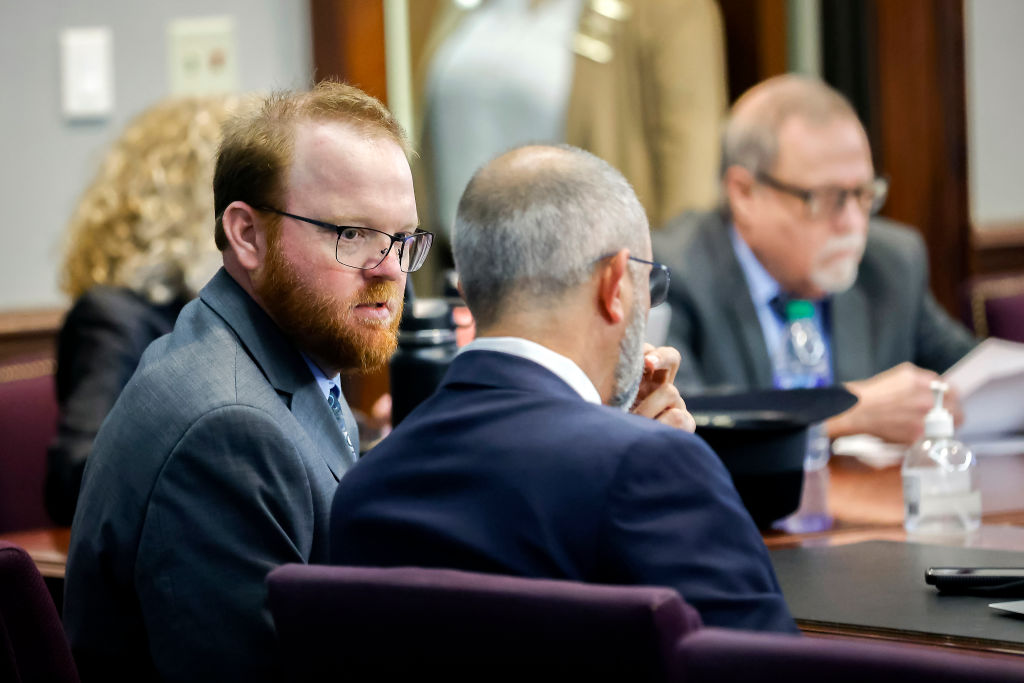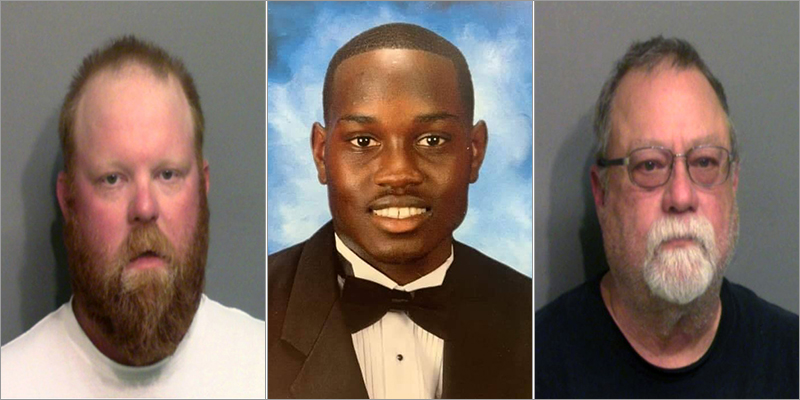Ahmaud Arbery’s Convicted Killers Desperately Seek New Trial For Lynching Unarmed Black Jogger

Source: Pool / Getty
UPDATED: 8:00 a.m. ET, Oct. 24, 2024
Originally published: May 26, 2020
Nearly ten months after asking a federal judge to throw out their hate crime convictions, the three white men who were found guilty of racially profiling and killing an unarmed Black jogger will be represented in a Georgia court on Thursday in an ambitious effort to seek a new trial.
Lawyers for father and son Greg and Travis McMichael and their neighbor, William “Roddie” Bryan, who were all convicted of murdering Ahmaud Arbery in 2020, have filed a motion requesting a new trial based on several “amended arguments,” according to News4Jax:
They range from a jury pool who they say could hear protestors outside the courthouse during jury selection to the true definition of a citizen’s arrest, and how they say the law governing the action had changed.
The defense even accuses prosecutors of using facial expressions throughout the trial to sway the jury.
The hearing for a new motion was scheduled back in June. It is set to be held at the Glynn County Courthouse in Brunswick with Judge Timothy R. Walmsley — who sentenced the murderous trio — presiding.
Previously, the three men were set to have an appeal of their hate crime convictions heard in March.
What happened to Ahmaud Arbery?
The tragic story begins with father and son Gregory and Travis McMichael and their friend William “Roddie” Bryan, who were all shown on video actively participating in Arbery’s killing in the middle of a street in broad daylight on Feb. 23, 2020. They were each facing life sentences for their roles in the racist and vigilante shooting that bore all the hallmarks of a modern-day lynching.
The three men were accused of racially Ahmaud Arbery, arming themselves, jumping in trucks, chasing him down, blocking his path in the streets, and then shooting him to death.
Holding them accountable has been a long time coming for Arbery’s loved ones and attorneys representing his family, who have been seeking justice in a case that was seemingly covered up by his murderers and their apparent accomplices in law enforcement, all with a cruel, allegedly racist twist.
The imagery associated with the horrific narrative surrounding the shooting and accused murderers harkened back to harrowing tales of racist white mob justice in the Jim Crow South.
Ahead of the murder trial, Arbery’s mother chose to recognize the positive instead of allowing herself to be consumed by the obvious negative on the bad on the grim anniversary of her son’s death at the young age of 25.
“It still hurts that I lost Ahmaud,” Wanda Cooper-Jones told the Atlanta Journal Constitution in an interview published Feb. 23, the anniversary of her son’s death. “Knowing that Ahmaud was possibly involved in change tells me he didn’t lose his life in vain.”
The events leading up to and including Arbery’s killing in the town of Brunswick have been unfolding in a complicated and tangled timeline amplified by an explosive collision of the South’s good old boy network with a very focused and resolute movement for Black lives.

Source: Getty Images
To say that the story has developed slowly would be an understatement. After all, the McMichaels were arrested and charged with murder more than two months after Ahmaud Arbery was killed. It would take another two weeks before Bryan, the man who filmed the shooting, would meet the same fate and be taken into custody and also be charged with felony murder along with criminal attempt to commit false imprisonment. That last charge likely stemmed from his role in using the vehicle he was in to trap Arbery between his and the McMichaels’ trucks as seen on the video recorded by Bryan that was shown to the world when it leaked — inexplicably by Gregory McMichaels — and posted to social media in May.
The shooting resulted in a series of Georgia’s district attorneys playing an unfortunate game of hot potato with the case, which has been marred from the start with a web of conflicts of interest from prosecutors whose associations with each other and the accused murderers have contributed to a massive delay of justice.
One of the central themes emerging from the case is Georgia’s glaring lack of hate crime laws. The case merits a hate crime charge, lawyers representing Arbery’s family have maintained. Civil rights attorneys S. Lee Merritt and Ben Crump have been calling for the Department of Justice to get involved to determine whether federal hate crime charges are warranted against Gregory McMichael, who actually pulled the trigger and killed Arbery.
An attorney for the family of Ahmaud Arbery, who was shot and killed in Georgia, in February, says there's a need for federal involvement in the Arbery case, because the state "doesn't have its own hate crime statute."
"We need the federal hate crime statute." pic.twitter.com/a2PVMNqf3n
— CNN Tonight (@CNNTonight) May 21, 2020
Another persistent theme in the case was the revelation of an incestuous and possibly corrupt relationship between multiple district attorneys’ offices across the state of Georgia, resulting in three prosecutors being forced to recuse themselves because of conflicts of interest.
Because of those themes, all 14 of Georgia’s Congressional representatives sent a letter last year to then-U.S. Attorney General William Barr encouraging the use of “all possible Federal resources to achieve full justice, transparency, and accountability in the case of Mr. Ahmaud Arbery.”
We’re literally hunted EVERYDAY/EVERYTIME we step foot outside the comfort of our homes! Can’t even go for a damn jog man! Like WTF man are you kidding me?!?!?!?!?!? No man fr ARE YOU KIDDING ME!!!!! I’m sorry Ahmaud(Rest In Paradise) and my prayers and blessings sent to the….. pic.twitter.com/r1PNxs8Vgn
— LeBron James (@KingJames) May 6, 2020
There was also the apparent campaign to criminalize Arbery in death to contend with, as a flurry of reputation-damaging yet ultimately irrelevant references to his past encounters with law enforcement that could never justify the killing of an unarmed man fueled by racist suspicions. That was the case when a video of police harassing Arbery from 2017 was widely published. This was the same police department that decided against making any arrests in Arbery’s killing until federal intervention pressured them to do so more than two months later.
Keep reading to find a complete and detailed timeline of the events that led up to Arbery’s shooting and those that have transpired since as his family works to achieve some semblance of justice in their loved one’s killing committed in unabashed cold blood.
window.addEventListener(‘interaction’, function () {
setTimeout(function () {
var s = document.createElement(‘script’), el = document.getElementsByTagName(‘script’)[ 0 ];
s.async = true;
s.src=”https://platform.twitter.com/widgets.js”;
el.parentNode.insertBefore(s, el);
}, 1000)
});




